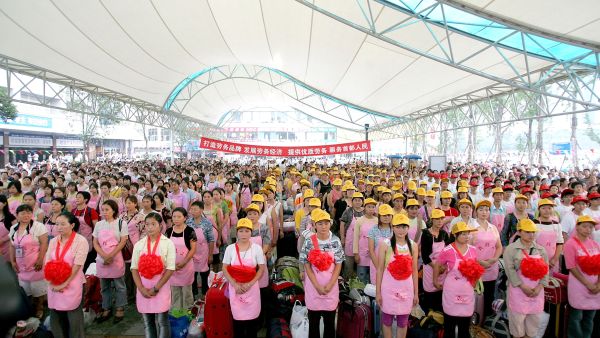The process of hiring home help can be a complicated business for both parties, laden with red tape and ambiguity. But there are guidelines available from Dubai’s Department of Naturalisation and Residency Department (DNRD) designed 7DAYS takes a look at what you need to know before taking on domestic staff, or before you begin working for a family. Can anyone work as a maid? Is there a minimum wage for the workers? Does a domestic worker need a contract? What are the obligations of an employer towards the worker? Filipino workers in any sector should be entitled to two days off per month, overtime, annual leave and sick leave among other clauses detailed on the embassy’s website. But if a maid’s employer refuses to adhere to those rules, the only option is often to leave. If a Filipina maid flees her employer, this is the process the Philippines Labour Office (POLO) will follow: A worker fills out an assistance form at the labour office before being interviewed by a case worker. In more complex cases, a welfare officer might also be assigned to the case. The sponsor is informed by the case officer that the worker is under the custody of the embassy and negotiates for the repatriation and payment of all dues for the worker. The sponsor may visit POLO for a conference. If a sponsor is not available or uncooperative, the foreign placement agency is called for case resolution or amicable settlement. Uncooperative foreign placement agencies who do not work with POLO in settling disputes can be temporarily banned from processing contracts with POLO. For cases requiring legal intervention, such as unpaid salary, and in cases that can’t be resolved amicably, the worker is assisted in filing the case against the sponsor before going to the DNRD. Repatriation can be arranged in most cases even if the passport has been taken by the sponsor. Airport assistance will also be organised by POLO for a worker leaving the UAE. *** USEFUL CONTACTS
to make the process more transparent for maids and sponsors.
How is a maid hired?
Domestic staff are subject to a different system of sponsorship and visa approval. They must be personally sponsored by an individual. A maid’s visa can be obtained by the head of the family (usually the male), whose salary is no less than Dhs6,000 a month or Dhs5,000 plus accommodation. Bachelors are not eligible to sponsor a maid.
Is the Ministry of Labour responsible for domestic workers and their employers?
Domestic workers are not covered by the Ministry of Labour and do not have a labour card. They are personally sponsored by the individual who hires them. The Ministry of Interior oversees domestic workers’ issues at a national level but in Dubai, it is the DNRD.
The government says the only countries from which domestic staff can be employed are: Sri Lanka, Indonesia, India, Ethiopia, Bangladesh and The Philippines. A maid from India or The Philippines must be older than 30, but not more than 60, according to their embassies.
Minimum wages have been set by the embassies of the workers, not the DNRD or UAE government. The monthly salaries differ. An Indian maid’s minimum salary is Dhs1,100 per month, Filipinas should be paid no less than Dhs1,400 and Sri Lanka has set salary at Dhs825. Indonesian maids’ minimum pay is Dhs800, while Bangladesh asks for Dhs750 for its nationals. Ethiopia has yet to formally set a minimum. The DNRD is keen to remind employers they are welcome to pay their staff more than the minimum.
A new unified contract (called employment agreement for domestic workers and sponsors) to regulate the rights and duties of domestic workers, was put in place from April 1, 2007. Every member of household staff must have a contract and it must be approved by the DNRD. They are usually binding for one or two years and can be renewed with the consent of both parties. Once a contract is expired, the maid is free to leave and does not have to pay any severance charge or fee to her employer.
What medical tests must a domestic worker undergo?
Sponsors must apply for a residency visa and medical report for the staff member within 30 days of her arrival in the country. Each maid has to be screened for HIV, pregnancy, Hepatitis B, Syphilis, TB and Leprosy. The Hepatitis B vaccination, which costs an additional Dhs50 is given in three doses - one immediately, a booster after one month and another booster after six months. A normal fitness test is required, it costs Dhs325 and takes five to seven days for the results.
A one-way ticket to the employee’s home country must be provided by the boss once the contract is ended and the worker is repatriated. During the tenure, a two-way ticket must be provided once a year to allow the worker to visit during annual leave.
The number of days of annual leave is not stipulated by the DNRD. Neither is the worker’s entitlement to days off.
What happens if there is a dispute between a maid and employer?
The DNRD now has an arbitration service to mediate in cases of complaints and it sets a two-week limit to resolve the issue. If the case is not closed, it is referred to the courts.
How is a maid’s visa cancelled?
Employers can apply to cancel the visa at any time, subject to a charge set by the DNRD. If a worker absconds, the employer can report the case to the DNRD and a ban may be placed on the individual in the event of a breach of contract or illegal activity. If a ban is placed because of a contract breach, it cannot be appealed by the maid, but the sponsor can apply to have it lifted with no charge.
Is it possible to hire home help part-time or without putting domestic staff on a visa?
The illegal hiring of maids, ie, without DNRD approval, may result in fines of up to Dhs70,000, as well as imprisonment for one month, followed by the deportation of the employer if he or she is an expat. You must use an agency for part-time help.
***
Philippines Labour Office outlines rules for workers
The Philippines Embassy is one of the most proactive in trying to protect the rights of workers and has its own rules detailing what is expected from employers.
If there is still no resolution it will be referred to Abu Dhabi Shariah Court Dispute and Amicable Settlement Section. Criminal cases are immediately passed to a dedicated unit within the Philippines Embassy, which will liaise with local police If an absconding case is filed, POLO will work with DNRD and the Ministry of Interior to cancel visas and reunite the worker
with her passport if it has been confiscated.
The DNRD website has up-to-date information on immigration law, sponsorship regulations and announcements for both sponsors and workers.
Enquiries hotline: 043 980 000
Customer service 24-hr line: 04 313 9999
Location: Al Jafiliya area next to Bur Dubai Police Station.
Email: amer@dnrd.ae
The Government of Dubai’s official website also has detailed information.
Go to www.dubai.ae

Domestic workers form a substantial group of migrant workers in the MENA region so there is room for hardships in the process.







